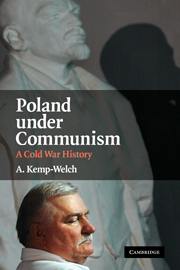15 - Abdication
Published online by Cambridge University Press: 06 January 2010
Summary
We don't want to win the elections.
We're not barging into government.
Wałęsa, February 1989, cited in Raina (ed.), Rozmowy, p. 374In early 1989, Alexander Yakovlev commissioned four reports on Eastern Europe. Their purpose was to review for the Soviet Party leadership the implications of changes so far. They were also asked to predict the directions of future change. We do not know what direct influence they had on Gorbachev himself. But the documents do show that he had a very perceptive range of analyses before him which anticipate some – though by no means all – of the drama of 1989.
The International Department of the Central Committee noted that the ‘transition to the principle of equality and mutual responsibility, launched in April 1985’ had reached a crucial stage. Former types of relations had been terminated, but new ones had yet to be established. Ruling parties could not continue to rule in the old ways but ‘new “rules of the game” – of managing the group interests that are pouring out, of finding a social consensus’ – had yet to be worked out. They recommended a differentiated response according to the countries concerned.
Poland and Hungary were moving towards pluralism. The ruling parties could only preserve their positions within a framework of political alliances. That required involving the opposition in constructive cooperation.
- Type
- Chapter
- Information
- Poland under CommunismA Cold War History, pp. 391 - 427Publisher: Cambridge University PressPrint publication year: 2008

